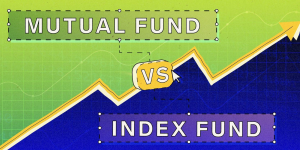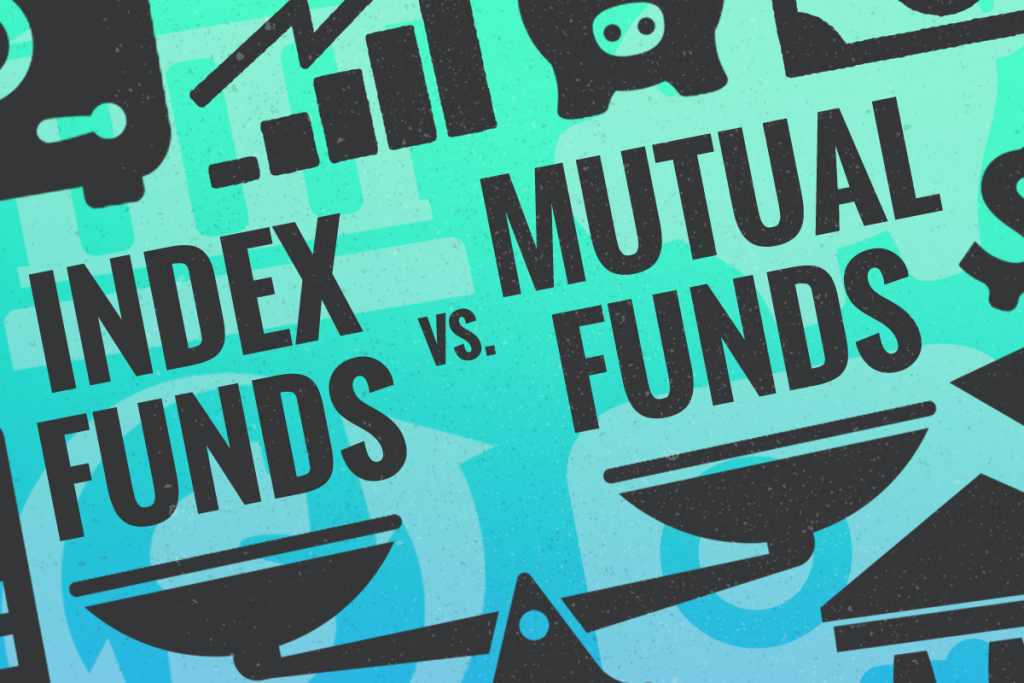Disclosure: Privacy Australia is community-supported. We may earn a commission when you buy a VPN through one of our links. Learn more.
Managed Funds Vs Indexed Funds — A Guide

There has been an ongoing discussion over the relative benefits of actively managed funds vs index funds. In terms of portfolio growth, both kinds of funds may be beneficial to investors. However, there are costs associated with each of these options that must be considered.
- Related guide: 📉 basics of the stock market for beginners
There are benefits and drawbacks to each mutual fund category. However, each investor’s situation and financial goals are unique, therefore the best funds to purchase will vary. Investment decisions can be greatly aided by becoming familiar with the distinctions between index funds versus actively managed funds.
Your choice of funds should match your requirements and goals, since what works well for one investor may not be good for another. What you need to know about indexed funds vs. actively managed funds is outlined here.
Table of Contents:
Definition of Index Funds 📘

Index funds are a kind of investment vehicle (mutual fund or ETF) designed to track the performance of an underlying stock market index.
An index in the stock market is a way to evaluate performance in a certain market niche. The S&P 500 Index, for instance, tracks the performance of the 500 biggest publicly traded corporations in the United States. Since investing directly in every corporation in an index is not always practical, index funds and ETFs provide an easier alternative.
An index fund, which is also a type of exchange-traded fund (ETF), is a kind of mutual fund that invests in assets that track a certain index. Stocks from the 100 biggest and most frequently traded non-financial domestic and foreign equities listed on the Nasdaq would be included in a fund that follows the Nasdaq-100 Composite Index, as an example.
To monitor an index that uses market capitalisation to determine which equities to include, index funds may be cap-weighted. The market capitalisation of a firm is equal to its share price multiplied by the number of outstanding shares of that company’s stock.
Some index funds, for instance, limit their coverage to large-cap stocks with market caps above $10 billion. Others focus on small-cap stocks with market caps between $250 million and $2 billion.
Passive investment strategies are used with index funds and index investing. That’s because the management of the fund makes fewer purchases and sales of assets inside the fund. Rather, the fund’s portfolio remains relatively stable over time by holding onto a stable set of holdings. When it comes to returns, index investing is less about outperforming the market and more about keeping pace with it.
What Are Actively Managed Funds? 💨

As we’ve shown, actively managed ETFs and mutual funds also mean a collection or basket of securities.
Active managed funds vary from index funds in that, rather than being passively managed and monitoring a certain index, a fund manager actively chooses which assets to include in an investment portfolio, in an effort to outperform the market. Because of this, fund turnover (the buying and selling of fund holdings) might be higher than in an index fund.
Fun Fact 💡: Did you know it wasn’t John Bogle, founder of The Vanguard Group, who founded index funds? In fact, the idea originated from an article entitled, “The Case for an Unmanaged Investment Company” by financial analysts Edward Renshaw and Paul Feldstein. (Source)
Managed Funds Vs Indexed Funds — Pros & Cons

What’s the best way to 💰 grow savings? … While index funds have many advantages, like any other kind of investing, they are not without their drawbacks.
The published prospectus for whatever index fund you’re interested in can provide useful info about the fund’s investment strategy, potential risks, and ongoing expenses. This might be useful in determining whether or not a certain index fund is suitable for your investing goals.
Likewise, to achieve a managed fund’s investment objectives, the manager of an actively managed fund makes investment decisions based on research and analysis of the market, as well as the management’s knowledge and experience with the securities held by the fund.
Actively managed funds, like index investing, have their advantages and disadvantages. The following are some considerations to bear in mind while evaluating them:
Advantages of Index Funds
- ✔️ Diversification made easier. Portfolio risk may be reduced by diversification. With index funds, investors have exposure to several assets that collectively reflect a certain index, making it simpler to diversify their holdings.
- ✔️ Cost. Index funds, which are passively managed, often have cost ratios that are much lower than the industry average of 0.57%. When there are fewer costs involved, more of your investment profits remain in your hands.
- ✔️ Saves money by minimising taxes. Another way index funds may save you money is by minimising your exposure to capital gains tax events, since they tend to occur less often in index funds than in actively managed funds.
- ✔️ Benefit from steady gains. The goal of an index fund is to provide results that are nearly identical to those of a chosen benchmark. If an index fund matches the performance of its underlying index, it may provide consistent returns over the long term.
Downsides of Index Funds
- ❌ Lack of results. Variations in index fund returns may be caused by a number of variables, including but not limited to, fees, cost ratios, and market circumstances. An index fund still might have returns that are lower than expected, rather than just matching its benchmark.
- ❌ Cost. Index funds often have lower expenses than managed funds, however, this is not always the case. While actively managed funds often provide lower costs, it is possible to invest in index funds that end up costing more.
- ❌ Error in keeping track. When an index fund’s performance deviates from its benchmark, this is known as a tracking error. This may occur if the composition of the fund is not representative of the composition of the stocks included in the index.
- ❌ Reduces the allowed amount of returns. The purpose of an index fund is not to outperform the market. If you just put your money into these funds, without also considering active investing tactics, you may be missing out on larger investment profits over the long term and reducing your return potential.
Advantages of Actively Managed Funds
- ✔️ Qualified experience in the field. Investors in actively managed funds may take advantage of the fund manager’s market expertise. An investor who is still learning the ropes of trading may find this comforting.
- ✔️ Greater financial gain. Actively managed funds aim to increase performance above the market. The fund’s returns may be higher than those of index funds if it is successful in achieving its goals.
Downsides of Actively Managed Funds
- ❌ Lack of results. Actively managed funds, like index funds, may underperform their benchmarks in the long run. This may occur if the management of the fund makes an error in selecting assets, or if external factors, such as a severe economic slump, have a negative impact on the market.
- ❌ The extortionate cost of management. Funds with active management incur more expenses than index funds that are managed passively.
- ❌ Risk. Due to the fund manager’s involvement in the buying and selling of securities, active trading might include more uncertainty than index investment.
- ❌ Taxes. Capital gains tax events are more likely to occur in actively managed funds due to the greater frequency with which assets are traded. More earnings from an actively managed fund need to be evaluated against the risk of incurring higher taxes.
Why Invest in Either? Managed Funds Vs Indexed Funds

1. Why Use Mutual Funds that are Actively Managed?
Many investors worry that the potential risks of actively managed funds outweigh the potential benefits.
It’s true that actively managed funds, in contrast to index funds, may not be optimal for a buy-and-hold investment strategy over the long run. They may not be suitable for everyone’s portfolio, but they might be enticing for those with more time or risk tolerance.
2. Why Buy Index Funds?
The buy-and-hold investor who is looking to invest for the long run may find more success with index funds and index investing. Value investing techniques, in which the focus is on identifying firms that are undervalued by the market, often coexist alongside buy-and-hold strategies.
Those who are looking to reduce their portfolio’s overall risk, such as retirees or those who are approaching retirement age, may find it convenient to use index funds for their investment needs, which might simplify their investment strategy over the long run. However, before deciding between index funds and actively managed funds, you should weigh the pros and downsides of each.
3. Index vs. Active Funds, Fees and Expenses
In terms of expenses, actively managed funds are already behind the eight ball when compared to passive index funds. To put it another way, the average continuous management expenditure of an actively managed fund is 1% more than that of its passively managed counterpart. One of the reasons actively managed funds can underperform their index is because of high fees.
4. Index vs. Active Funds, Comparing Tax Efficiencies
Another issue, which is not reflected in fund return numbers, is that the portfolio manager of an actively managed fund — in search of higher returns—buys and sells investments more frequently than an index fund does. This buying and selling of stocks by the active manager — known as “turnover” results in taxable capital gains to the fund shareholders, provided the fund is owned in a non-retirement account.
- Get set up with an 🖱️ Safe Online Trading App
Tip (not financial advice…) 💡: If you’re only earning $1,000-$2,000 per month, you may need to grow your income much more before thinking about making investments.
Do Your Research 🌐
Should you invest in index funds or managed portfolios?
Investors may get similar outcomes from both actively managed funds and index funds, but they do it in different ways and with varying degrees of success. Investors should weigh their own unique needs and goals when deciding between index funds and managed funds.
You should weigh the importance of consistent returns vs the opportunity to outperform the market when deciding between index funds and actively managed funds. Although actively managed funds sometimes exceed market indexes, underperformance relative to their benchmarks is still possible as it depends on the overall performance of the index (guide: ⭐ how to invest in the ASX 200).
When compared to actively managed funds, index funds may provide better long-term stability and protection against market fluctuations. In theory, it’s still possible to lose money in an index fund, although the odds are lower. Even while lower investment fees may seem good when projecting net returns, you should also look at each fund’s costs and performance separately to make sure you’re happy with the estimate.
Bottom Line 🌞
Whether you are better off with index funds versus managed ones may depend on several factors including how old you are, how long you want to invest, how much risk you are willing to take, and what you hope to achieve.
Index investing may be the way to go if you want a hands-off, goals-based investment strategy that also has reduced fees and works using automation methods similar to Robo-Advisors. If, on the other hand, you want to try to outperform the market, active investing may be worth looking into.
SoFi Invest is a great place to begin whether you’re interested in buying stocks or exchange-traded funds. “DIY” active investors and passive investors alike have the option of selecting a strategy that best fits their risk tolerance and time availability with both active and passive investment strategies available.
Managed Funds Vs Indexed Funds 📙 – FAQs
What is an Index Fund?
Investors in index funds often expect a low level of management involvement. The goal of an index fund is to provide returns that are similar to those of the index it tracks, by investing in all or nearly all of the securities included in that index. Hundreds of market indices are available for investment via mutual funds and exchange-traded funds.
What are actively Managed Funds?
In an actively managed fund, the portfolio manager uses investment selection in an attempt to outperform the market. In order to beat a market index like the S&P 500, the manager analyses a wide variety of assets.
Index Funds vs Actively Managed Funds: Which Should You Invest In?
Actively managed funds may potentially outperform the market, which is a major selling point for many investors who might otherwise go for index funds. Why settle for an index fund, from which you’ll get nothing except the market return after paying a little charge to the fund’s manager?
It is difficult to uncover proof that actively managed funds can reliably outperform their respective index. If picking an index fund was difficult, it’s far more difficult for an individual to choose an actively managed fund that would exceed the index in a given year.
For the ten years ending June 30, 2020, 180 of Vanguard’s 205 funds beat their peer group averages, according to research comparing the performance of index funds with actively managed funds conducted by Vanguard.
- Every Vanguard MMF
- Almost all Vanguard bond ETFs
- Almost all Vanguard balanced funds
- 92 out of 107 Vanguard stock funds.
To be clear, however, not all Vanguard funds are index funds but most of the above were. However, these outcomes still demonstrate the superiority of passive investing over active investing in the long run.
Active Management: Luck or Skill?
You might point out that some funds indeed beat their indexes, so why not buy those? How do we know whether the active manager was skilled in their investment selection or was just lucky? Evidence from a Barclays study shows that the chance for continued outperformance is slim for an active manager to continue beating the index.
What Are Mutual Funds?
Investors in a mutual fund combine their money to purchase a wide range of assets. Investments in stocks, bonds, and even real estate may be made via mutual funds. They make it easier for traders to diversify their holdings and reduce risk.
How Can You Invest in Mutual Funds?
To begin, choose the mutual fund (for example, a popular index fund) you want to purchase. Think about the fund’s minimum investment, management style (active vs. passive), fees, and holdings. After doing some research on mutual funds, you may create a brokerage account to start buying shares.
Related Guides:






